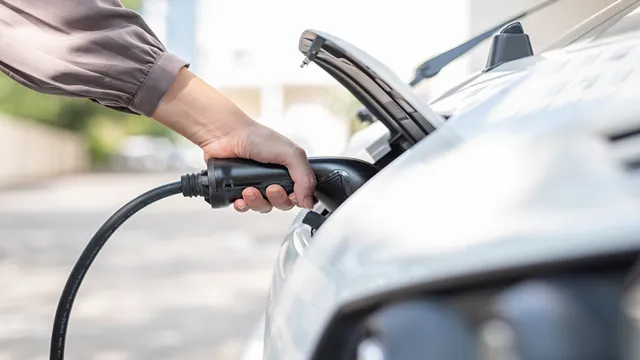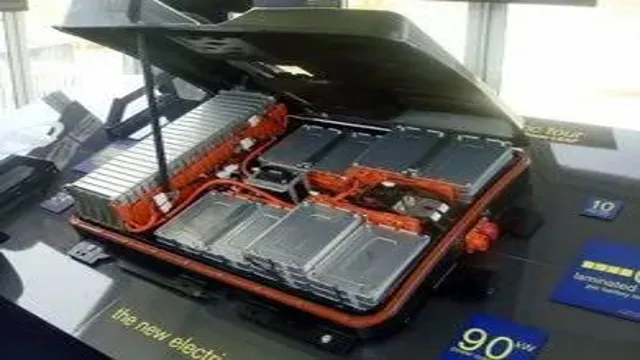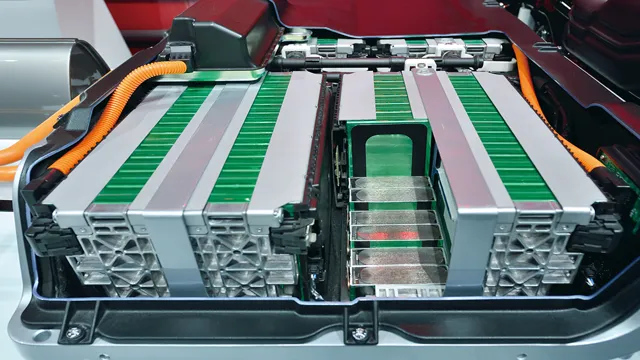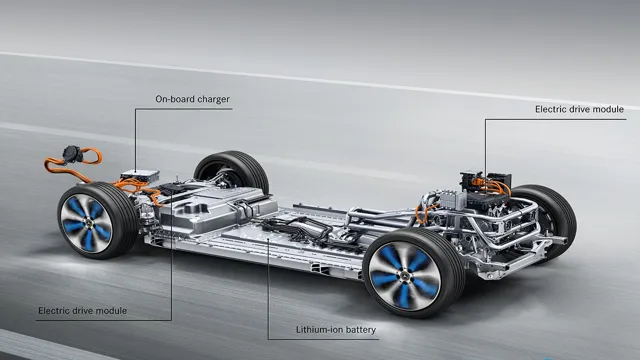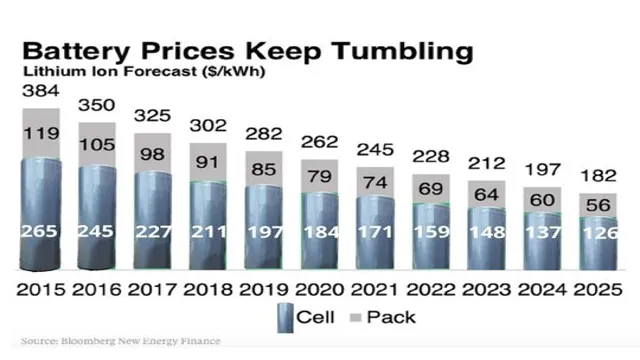Revolutionizing the Way You Commute: How Many Miles Can You Go on a Single Charge in an Electric Car Battery?
Have you ever wondered how far an electric car can take you? With the growing popularity of electric vehicles, more and more people are considering making the switch from gas-powered cars to cleaner and more sustainable electric cars. But one of the biggest concerns for potential electric car buyers is the battery range. How far can you actually go before the battery runs out? The truth is, the electric car battery range varies depending on several factors such as the car model, the driving conditions, and the temperature.
Electric cars typically have a range of 100 to 400 miles on a single charge. However, some luxury electric cars like Tesla’s Model S can travel up to 400 miles on a full charge. But if you’re driving in extreme temperatures, such as very cold or very hot weather, the battery range can decrease by up to 40%.
Another thing to keep in mind is that the way you drive your electric car can also affect the battery range. Driving at high speeds or constantly accelerating and braking can drain the battery faster, ultimately decreasing the electric car’s range. On the other hand, driving at lower speeds and using regenerative braking, which allows the car to recharge the battery when you brake, can help increase the electric car’s range.
Overall, the electric car battery range is improving every year as technology advances and more manufacturers invest in electric vehicle production. So, if you’re considering purchasing an electric car, make sure to do your research and consider your driving habits before making a decision.
Factors Affecting Mileage
One of the biggest factors affecting the mileage of electric cars is the battery’s capacity. The more charge a battery can hold, the farther the car can travel before needing to be recharged. Other factors that can affect mileage include driving conditions, such as temperature, terrain, and speed.
Electric cars tend to perform better in mild temperatures, and hilly or mountainous terrain can decrease mileage. Similarly, driving at higher speeds can also decrease mileage as more energy is needed to power the vehicle. Other factors include the weight of the car and its cargo, as well as the driving style of the driver.
By considering these factors, electric car owners can optimize their vehicle’s performance and get the most out of their battery miles before needing to recharge.
Terrain and Elevation
When it comes to calculating mileage, terrain and elevation play a crucial role in determining the distance travelled. Uphill terrains and elevated roads often lead to higher fuel consumption as the engine has to work harder to cover the distance. Similarly, rough terrain can be an obstacle that reduces the mileage significantly.
This is because the wheels will encounter more friction on uneven roads, leading to more fuel consumption. On the other hand, flat terrains and smooth roads can aid in improving mileage. When driving on such terrains, the engine will not have to strain as much, leading to better fuel efficiency.
Thus, it’s essential to consider the terrain and elevation of your route when estimating fuel consumption. By doing so, you can plan your trip more economically and save on fuel costs in the long run.

Temperature and Weather
When it comes to fuel economy, temperature and weather are huge factors to consider. The colder the weather, the longer it takes for an engine to warm up to optimal temperature. This means that the engine will be using more fuel to keep running until it reaches an ideal temperature.
On the other hand, hot weather can also have an impact on fuel economy. Cars require more energy to power the air conditioning in hotter temperatures, which means they will use more fuel. Additionally, hot weather can cause more air resistance, making the engine work harder and using more fuel to maintain speed.
Overall, it’s important to keep in mind how both hot and cold weather can affect your car’s mileage. One way to help maintain fuel economy in extreme temperatures is to keep your car properly maintained and serviced. This includes things like checking tire pressure and changing air filters regularly.
By doing so, you’ll ensure that your car is running at its best and getting the most out of each gallon of gas.
Driving Habits
When it comes to getting the most out of your car’s gas mileage, the way you drive can have a huge impact. Factors such as speeding, rapid acceleration, and frequent braking can all decrease your fuel efficiency and cost you more money at the pump. On the other hand, driving at a steady pace, maintaining a safe distance between other vehicles, and avoiding unnecessary idling can greatly increase your mileage.
For example, think of your car as a marathon runner- it’s much easier to maintain a steady pace and conserve energy than to constantly sprint and stop. Additionally, keeping your tires properly inflated and cutting down on excessive cargo or weight can also improve your mileage. Remember, every driver has the power to affect their car’s fuel efficiency- so try making some small changes in your driving habits and see the difference it can make over time.
Most Mileage You Can Expect
When it comes to electric cars, the number of miles you can expect to travel before needing to recharge the battery depends on several factors. These factors include the size of the battery, the efficiency of the motor, and the driving conditions. On average, most electric cars can travel between 100-300 miles before needing to be recharged.
However, some electric cars, such as the Tesla Model S and the Chevrolet Bolt, can travel upwards of 300-400 miles before needing to recharge. Keep in mind that driving conditions, such as cold weather and hilly terrain, can also affect the number of miles you can travel before needing to recharge. Additionally, driving habits such as frequent acceleration and braking can also deplete the battery faster.
If you’re considering purchasing an electric car, it’s essential to research the range and charging options to ensure it meets your needs. Overall, with advancements in technology, the distance electric cars can travel before recharging continues to increase, making them a viable option for those concerned about their carbon footprint and saving money on gas.
EVs with the Longest Ranges
If you’re in the market for an electric vehicle (EV) with a long range, you’ll be pleased to know that there are plenty of options to choose from. The most mileage you can expect comes from the Tesla Model S Long Range, which boasts an impressive range of up to 402 miles on a single charge. Other EVs with long ranges include the Porsche Taycan with up to 300 miles, the Audi e-tron with up to 222 miles, and the Chevrolet Bolt with up to 259 miles.
That being said, it’s important to note that range can vary depending on various factors such as driving habits, weather conditions, and terrain. Nevertheless, the advancements in EV technology have made it possible for drivers to have peace of mind when it comes to going the distance.
EVs with the Shortest Ranges
When it comes to electric vehicles, one of the factors that potential buyers are often concerned about is the range they can expect. While newer EVs are consistently pushing the limits and offering longer ranges, older models may still have shorter ranges that could limit their use for some drivers. The most mileage you can expect from the EVs with the shortest ranges varies depending on the specific make and model, but generally falls somewhere between 50 and 100 miles per charge.
This may be fine for drivers who only need to make short trips around town, but could be a concern for those who need to travel longer distances regularly. However, it’s important to note that even the shortest range EVs can still offer significant cost savings over gasoline-powered vehicles, as they require less maintenance and take advantage of lower electricity rates. So while the range may not be ideal for some, these models can still be a great option for certain drivers.
Tips on How to Maximize Your Range
If you’re an electric car owner, you probably know how important it is to maximize your range. Nobody wants to get stranded on the side of the road, waiting for a tow truck because they didn’t plan their route well enough. So, how do you make the most of your electric car battery miles before needing to recharge? Firstly, it’s smart to avoid using the air conditioning or heating systems to maintain a pleasant temperature in the car.
Additionally, always make sure to keep your tire pressure at the manufacturer’s recommended level, as underinflated tires can reduce your range. Finally, watch your speed – the faster you drive, the more quickly you’ll drain your battery. By following these simple tips, you can make the most of your electric car’s range, ensuring a smooth and enjoyable driving experience.
Plan Your Route Carefully
Maximizing the range of your EV is all about planning your route carefully. One of the most important tips for maximizing your EV’s range is to avoid blasting the A/C or heating system, especially when you don’t need it. These systems drain a significant amount of battery power, which can significantly reduce your range.
Another way to maximize your range is to avoid aggressive acceleration and braking – both of which can consume energy from the battery, resulting in a decrease in range. Instead, try to drive smoothly and maintain a consistent speed. You should also make it a habit to keep your EV well-maintained.
Regular maintenance can help improve the overall efficiency of your vehicle, resulting in better range. Keep your tires properly inflated and avoid carrying unnecessary weight – both of which can impact your vehicle’s range. Another tip for maximizing your EV’s range is to make use of regenerative braking.
Regenerative braking is a feature that captures energy that would otherwise be lost during braking and converts it into electricity to recharge the battery. By using this feature, you can extend your vehicle’s range and reduce the frequency of recharging. In conclusion, maximizing the range of your EV requires careful planning, mindful driving habits, and proper maintenance.
By implementing these tips, you can significantly increase your vehicle’s range and enjoy a more eco-friendly and cost-effective driving experience. So, plan your route carefully and make the most out of your EV’s capabilities!
Use Your Car’s Regenerative Braking
Regenerative braking is a fantastic feature that many electric cars come equipped with, and it’s something that you should take advantage of as often as possible. Essentially, regenerative braking is a process that takes the kinetic energy that’s lost when you apply the brakes to your car and converts it into electrical energy. This energy can then be stored in your car’s battery pack, giving you a little bit of extra range when you need it most.
To really maximize your range, it’s important to use regenerative braking whenever you can – this means planning out your driving routes carefully, and anticipating when you might need to slow down or come to a stop. By doing this, you’ll be able to capture as much energy as possible and keep your battery charged up for longer. So next time you’re out on the road, don’t be afraid to tap into the power of regenerative braking – your battery (and your wallet) will thank you!
Final Thoughts
As electric cars continue to gain popularity, one of the key concerns for potential buyers is how far they can travel before needing a recharge. The distance an electric car battery can go before recharging is called the range. The range varies depending on the car model, battery size, and driving conditions, but on average, most electric cars can travel around 100 miles before needing a recharge.
Of course, this can vary widely based on driving habits, such as how much you rely on air conditioning or heating, and how much you accelerate and brake. However, with advancements in battery technology, many electric car owners find that the range is no longer a major concern. With the availability of charging stations and the ability to charge at home, owning an electric car has become more convenient than ever.
So, while 100 miles may not seem like a lot compared to traditional gasoline-powered vehicles, it’s important to remember that electric cars are not meant for long road trips, but rather for daily commuting and errands. With that in mind, the range of most electric cars is more than enough to meet the needs of the average driver.
Conclusion
In the world of electric cars, a battery’s range before needing to be recharged has become the key measure of performance. It’s a bit like holding your breath – the longer you can go, the better you feel. But whereas holding your breath can leave you blue in the face, pushing your electric car’s battery to its limits can leave you stranded on the side of the road.
So whether you’re driving a Tesla or a Nissan Leaf, the range of your battery is the distance between you and your next adventure.”
FAQs
How long can an electric car battery last before needing to be recharged?
The mileage an electric car battery can last before needing to be recharged varies between different models and brands. However, on average, most current electric car models can drive between 100-250 miles before needing to be recharged.
Can I charge an electric car battery without owning a charging station?
Yes, electric car batteries can be charged using several alternative methods such as public charging stations, workplace charging stations, and even using a standard power outlet. However, it may take longer to fully charge the battery using alternative charging methods.
What are the benefits of owning an electric car with a long battery life?
Owning an electric car with a long battery life can save you money on fuel costs, provide a more eco-friendly transportation option, and offer a smoother and quieter driving experience. Additionally, many countries and cities may offer incentives such as tax credits or parking benefits for electric car owners.
Do electric car batteries have a limited lifespan?
Yes, electric car batteries have a limited lifespan and will eventually lose some of their capacity over time. However, the lifespan and degradation of an electric car battery can vary greatly depending on factors such as usage, charging habits, and environmental conditions. Many electric car manufacturers also offer warranties or battery replacement programs.

